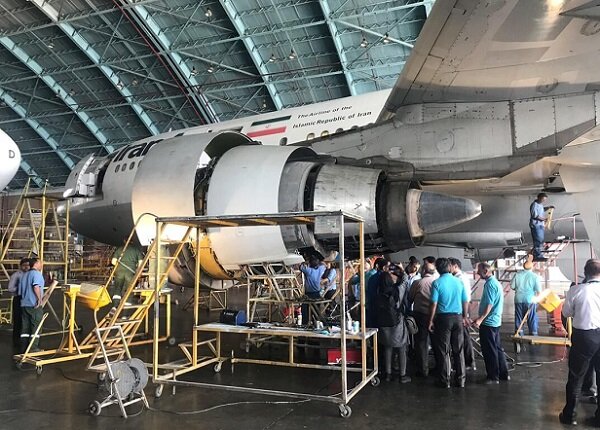
Inspecting Airbus jet engines, April 2022
“Some countries that were sanctioned… are coming to Iran and entrusting their planes to Iranian experts.”
Iran’s air transportation industry is under stress due to international sanctions.[i] In response to the sanctions, the Mehr News Agency reports that Iran’s Ministry of Defense has developed the industrial and technical capacity to develop spare aircraft parts and conduct maintenance on critical systems like aircraft engines.[ii] While this follows a known pattern of Iranian claims to immunize themselves from international sanctions, the current iteration differs because Iranian officials openly say they will use their new capacity to help other countries subject to international sanctions.
The willingness to help Russia or other countries evade sanctions, for example, by shipping drones to Russia, signals both a sense of impunity among Iranian officials but could also reflect growing substance to Iran’s alliances with other states that find themselves international pariahs. For Iran to help Russia service its leased Boeing or Airbus aircraft fleshes out bilateral relations beyond simply a one-way drone trade. Iran’s stated willingness to bypass sanctions to maintain or potentially upgrade Russian aircraft can have broad ramifications on the operational environment, not only in the Middle East but elsewhere around the world. First, Iranian efforts to help subjected states bypass sanctions blunt a major tool of international diplomacy meant to deter rogue or aggressive behavior. Second, supplying sanctioned states much-needed aviation hardware would be a boon to Iranian defense industries both financially and by allowing them greater opportunities to reverse engineer platforms such as the Sukhoi-35S [R1].[iii] Finally, money earned by Revolutionary Guard-run factories could also help support or subsidize Revolutionary Guard or proxy activities across the region.
Sources:
“خودکفایی ایران در ساخت قطعات هواپیماهای مسافربری”(Iran’s self-sufficiency in the manufacture of passenger plane parts),” Mehr News Agency (semi-official news agency owned by Iranian government’s Islamic Development Organization), 9 March 2024. https://www.mehrnews.com/news/6049371
In an interview with Mehr, Javad Mashayekh, with reference to Iran’s self-sufficiency in the field of manufacturing passenger aircraft parts that researchers and specialists in knowledge-based companies have achieved, stated, “In the field of commercial and passenger planes, Iran was once dependent on procurement of aircraft parts, even for maintenance but because of sanctions,
we were unable to procure parts from other international suppliers. The deputy of the scientific department of knowledge-based economy development added, “This is what happened after the imposition of sanctions: Some of Iran’s knowledge-based companies used their power to develop car parts, and repair and maintenance of aircraft engines locally.” Mashayekh also said that the most complex part of an aircraft is its engine and, he noted, maintenance requires a high degree of technical knowledge. We promise that in these fields, our country has achieved self-sufficiency so we do not need to send out planes to foreign countries for almost any kind of repair or to have maintenance done there.
He continued, “In fact, we are currently witnessing that some countries that were sanctioned for various reasons and are not able to supply parts and get maintenance services are coming to Iran and entrusting their planes to Iranian experts…. For example, Russia has suffered many sanctions in the aviation sector due to the Ukraine crisis, and for this reason, it has concluded good contracts for maintenance services with Iranian knowledge-based companies.”
Notes:
[i] In 2016 Iran sought to purchase nearly 200 passenger jets split between Boeing and Airbus. At the time, the Iranian government justified the deals as an air safety matter. However, ambitions for a new fleet faltered as seating capacity of the new jets outstripped Iranian passenger traffic projections. Critics claimed the proposed deals were meant to provide spare parts to keep Iran’s military aircraft aloft. While Boeing and Airbus planes do not contain parts suitable for jet fighters, passenger jets and military cargo planes can share many parts. Boeing ultimately cancelled its deal, while Airbus delivered only four planes.
[ii] For discussion of Iranian turbojet engine development, see: Michael Rubin, “Iran: New Heavy Engines on the Drawing Board,” OE Watch, November 2016. https://community.apan.org/wg/tradoc-g2/fmso/m/oe-watch-past-issues/195245/download
[iii] For discussion of the Iranian desire for Sukhoi-35s, see: Michael Rubin, “Iran Wants Sukhoi-35 Fighters From Russia,” OE Watch, 10-2022. https://fmso.tradoc.army.mil/2022/iran-wants-sukhoi-35-fighters-from-russia/
Image information:
Image: Inspecting Airbus jet engines, April 2022
Source: https://media.mehrnews.com/d/2024/03/08/3/4894679.jpg?ts=1709893408775
Attribution: Mehr News Agency
